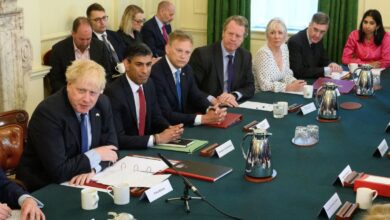
Will Labour Be Better at Tackling Dirty Money Than the Tories?
Will Labour be better at tackling dirty money than the Tories? That’s the burning question on many minds, especially given the increasing scrutiny of illicit finance in the UK. This post dives deep into the policies, records, and proposed approaches of both Labour and the Conservative party, comparing their strengths and weaknesses in the fight against money laundering and other financial crimes.
We’ll explore the practical implications of each party’s approach across various sectors, and examine how their strategies stack up against international standards.
We’ll analyze Labour’s specific policy proposals, examining their enforcement mechanisms and comparing them to the current Conservative government’s methods. We’ll also look at the Conservatives’ track record, highlighting both successes and criticisms, and exploring specific instances where their approach has fallen short. Ultimately, we aim to provide a balanced and informed assessment, helping you to form your own opinion on which party is better equipped to tackle this critical issue.
Labour’s Proposed Policies on Tackling Dirty Money
The fight against illicit finance is a complex and persistent challenge, requiring robust and innovative approaches. While the current Conservative government has implemented various measures, the Labour party has Artikeld a more ambitious and, they argue, more effective strategy to tackle dirty money entering and operating within the UK. This involves strengthening existing regulations, introducing new enforcement mechanisms, and focusing on transparency and international cooperation.Labour’s proposed policies represent a significant shift in approach, aiming to close loopholes exploited by those involved in money laundering and other financial crimes.
Their plans focus on increased scrutiny of high-risk sectors, stronger penalties for offenders, and a greater emphasis on preventative measures. This contrasts with the Conservative approach, which critics argue has been too reactive and insufficiently proactive in preventing illicit finance from taking root.
Labour’s Specific Policy Proposals
Labour’s plan to combat dirty money involves a multi-pronged approach. Key proposals include strengthening the existing anti-money laundering (AML) and counter-terrorist financing (CTF) frameworks. This involves increasing resources for enforcement agencies, such as the National Crime Agency (NCA), to investigate and prosecute complex financial crimes. They also propose stricter regulations on companies operating in high-risk sectors, such as real estate and legal services, demanding greater transparency and due diligence.
Further, Labour advocates for a public register of beneficial ownership, offering greater visibility into the ultimate owners of companies, making it harder to conceal illicit funds.
Enforcement Mechanisms
Labour’s proposed enforcement mechanisms include significantly increased funding for the NCA and other relevant agencies. This would allow for more investigations, prosecutions, and asset seizures. They also plan to introduce harsher penalties for those convicted of financial crimes, including longer prison sentences and larger fines. The increased funding would also support the development of more sophisticated investigative techniques and data analysis capabilities, enabling agencies to better identify and track suspicious financial activity.
Finally, Labour emphasizes stronger international cooperation, working with other countries to share information and pursue cross-border investigations.
Comparison with Current Government’s Approach
The key difference between Labour’s proposed approach and the current government’s lies in the scale and scope of the intervention. While the Conservatives have focused on incremental changes and adjustments to existing legislation, Labour proposes a more radical overhaul, aiming for a more proactive and preventative strategy. This involves not just strengthening existing enforcement but also significantly increasing resources and expanding the scope of regulatory oversight.
The Conservatives’ approach, some argue, has been hampered by under-resourcing and a lack of political will to tackle powerful vested interests.
Comparative Table: Labour vs. Current Government
| Policy Area | Labour’s Approach | Current Government’s Approach | Key Differences |
|---|---|---|---|
| Beneficial Ownership Transparency | Public register of beneficial ownership | Existing register, but with limitations and ongoing debates about further reforms | Full transparency vs. limited transparency; proactive vs. reactive |
| Enforcement Agency Resources | Significant increase in funding for NCA and other agencies | Incremental increases, with ongoing debates about sufficient resourcing | Substantial increase vs. gradual increase; proactive investment vs. reactive adjustments |
| Penalties for Financial Crime | Harsher penalties, including longer prison sentences and larger fines | Existing penalties, with occasional increases but often criticized as insufficient deterrents | Significantly stronger deterrents vs. relatively weaker deterrents; focus on impactful punishment |
| Regulation of High-Risk Sectors | Stricter regulations and increased due diligence requirements for high-risk sectors (e.g., real estate, legal services) | Existing regulations, with ongoing reviews and adjustments, but often criticized for loopholes | More comprehensive and proactive regulation vs. reactive adjustments and perceived loopholes; emphasis on prevention |
Conservative Party’s Record on Tackling Dirty Money: Will Labour Be Better At Tackling Dirty Money Than The Tories
The Conservative Party’s record on tackling dirty money is a complex and often debated topic. While the government has implemented various measures aimed at combating money laundering and other financial crimes, criticisms regarding their effectiveness and commitment persist. This section examines the actions taken, the criticisms levelled, and specific examples of alleged failures.The Conservative government has introduced several initiatives to combat illicit finance.
These include increased funding for law enforcement agencies specializing in financial crime, the implementation of stricter regulations for banks and other financial institutions, and the establishment of new reporting mechanisms for suspicious activity. Furthermore, international collaborations have been pursued to strengthen the global fight against money laundering. However, the impact of these measures has been subject to considerable scrutiny.
Insufficient Resources and Enforcement
A persistent criticism of the Conservative government’s approach is the perceived insufficiency of resources dedicated to tackling financial crime. Critics argue that understaffing and underfunding of relevant agencies hinder effective investigation and prosecution of complex money laundering cases. This lack of resources, it is claimed, allows criminals to operate with relative impunity. For example, reports have highlighted the significant backlog of cases awaiting investigation within the National Crime Agency (NCA), leading to delays and potential loss of evidence.
The insufficient number of specialist financial investigators is frequently cited as a major contributing factor to this backlog.
Weaknesses in Regulatory Oversight
Another area of concern focuses on the effectiveness of regulatory oversight. Critics point to instances where loopholes in existing regulations have allowed dirty money to flow through the UK financial system. The failure to adequately monitor and regulate certain sectors, such as real estate and high-value art transactions, has been highlighted as a significant weakness. The lack of transparency in the ownership structures of some companies has also been identified as a major problem, making it difficult to trace the origins of funds.
So, will Labour truly be tougher on dirty money than the Conservatives? It’s a tough question, and honestly, political maneuvering often overshadows genuine reform. Reading Charles Hurt’s take on Rashida Tlaib – charles hurt on tlaib something really wrong with someone who uses grandma as political pawn – highlights how easily personal narratives can eclipse larger issues.
Ultimately, judging which party will be more effective requires a deeper dive into their specific policy proposals and track records.
One specific example frequently cited is the ease with which high-value properties are purchased using opaque offshore structures, allowing the ultimate beneficial owner to remain hidden.
Alleged Failures in Specific Cases
Several high-profile cases have fueled criticisms of the Conservatives’ handling of dirty money. The alleged involvement of politically connected individuals in questionable financial transactions has raised concerns about potential conflicts of interest and a lack of political will to effectively pursue investigations. The slow pace of investigations and the relatively low number of successful prosecutions in such cases have further exacerbated these concerns.
So, will Labour really be tougher on dirty money than the Tories? It’s a tough question, especially considering the global scale of the problem. Think about the complexities involved, like the funding of conflicts – reading about the foreigners fighting and dying for Vladimir Putin really highlights how opaque these financial flows can be. Ultimately, whether Labour can truly make a difference remains to be seen, but their approach needs to be far more robust than just rhetoric.
While specific details of these cases are often subject to ongoing legal proceedings, the perception of insufficient action remains a persistent criticism.
Key Criticisms of the Conservative Record
The following list summarizes key criticisms levelled against the Conservative government’s record on tackling dirty money:
- Insufficient funding and resources allocated to law enforcement agencies tackling financial crime (Source: Numerous reports from investigative journalists and parliamentary inquiries).
- Weaknesses in regulatory oversight, particularly in sectors prone to money laundering (Source: Reports from the Public Accounts Committee and the National Audit Office).
- Lack of transparency and accountability in the handling of investigations involving politically exposed persons (Source: Media reports and campaign groups advocating for greater transparency).
- Slow pace of investigations and a low number of successful prosecutions in high-profile cases (Source: Data from the Crown Prosecution Service and the NCA).
- Inadequate measures to prevent the use of shell companies and opaque offshore structures (Source: Reports from international organizations such as the Financial Action Task Force).
Transparency and Accountability in Each Party’s Approach
The fight against dirty money requires not just robust policies, but also a commitment to transparency and accountability from the parties involved. Both Labour and the Conservatives have Artikeld approaches, but their levels of transparency and the mechanisms for accountability differ significantly. A critical examination of these differences is crucial for voters to assess which party offers a more effective and trustworthy strategy.
Labour’s Proposed Transparency and Accountability Measures
Labour’s proposals emphasize increased transparency in beneficial ownership registers, stronger enforcement of existing regulations, and independent oversight. They propose extending the register to encompass a wider range of legal entities and strengthening the powers of investigative bodies like the National Crime Agency (NCA). Accountability would be enhanced through regular parliamentary scrutiny of the NCA’s performance and the establishment of an independent body to review the effectiveness of anti-money laundering measures.
For example, Labour’s plans to increase funding for the NCA and introduce stricter penalties for non-compliance aim to demonstrate their commitment to effective enforcement. The proposed independent review body would provide an external check on government performance, ensuring transparency and identifying areas for improvement.
Conservative Party’s Record on Transparency and Accountability
The Conservative party’s record on transparency in tackling dirty money has been a subject of ongoing debate. While they have implemented some measures, critics argue that these haven’t gone far enough and that a lack of transparency hampers effective enforcement. Accountability mechanisms have been criticized as insufficient, with concerns raised about the independence and resources of investigative bodies.
For instance, the implementation of the beneficial ownership register, while a step forward, has faced criticisms regarding its scope and effectiveness in uncovering complex ownership structures. Furthermore, the level of public reporting on successful prosecutions and investigations has been seen as inadequate by some observers. The lack of independent oversight, coupled with concerns about resource allocation to relevant agencies, contributes to a perception of insufficient accountability.
Comparative Infographic: Transparency and Accountability
The infographic would be a two-column table, one for Labour and one for the Conservatives. The top row would list key areas: Beneficial Ownership Registers (Scope and Access), Enforcement Agencies (Funding & Powers), Independent Oversight (Existence and Powers), Public Reporting (Frequency and Detail), and Penalties for Non-Compliance (Severity and Enforcement). Each subsequent row would then compare the two parties’ approaches in each of these areas using a rating system (e.g., high, medium, low) or a simple yes/no for the presence of a specific mechanism.
A visual representation, such as using different shades of colour or bar charts within each cell, could clearly illustrate the differences. For example, a darker shade of green could represent a “high” level of transparency for Labour in beneficial ownership, while a lighter shade of red could indicate a “low” level for the Conservatives. This would visually highlight the key distinctions between the two parties’ approaches to transparency and accountability in combating dirty money.
Will Labour be better at tackling dirty money than the Tories? It’s a tough question, especially considering recent events. The news about the FBI, as reported in this article, fbi singles out conservative agents in purge retaliates against whistleblowers gop lawmakers , raises serious concerns about political influence on investigations. This makes me wonder if either party is truly equipped to effectively combat corruption on a large scale.
Ultimately, only time will tell if Labour’s approach will be significantly more effective.
The infographic would provide a concise, easily digestible comparison, allowing readers to quickly grasp the relative strengths and weaknesses of each party’s approach.
Impact of Each Party’s Approach on Different Sectors
The differing approaches of the Labour and Conservative parties to tackling dirty money will have significant and varied impacts across different sectors of the UK economy. Understanding these potential consequences is crucial for businesses, individuals, and the overall health of the financial system. This analysis will focus on the real estate, finance, and non-profit sectors, highlighting potential positive and negative outcomes under each party’s proposed strategies.
Impact on the Real Estate Sector, Will labour be better at tackling dirty money than the tories
Labour’s increased scrutiny of property transactions, coupled with their proposed strengthening of anti-money laundering regulations, could lead to a slowdown in high-value property purchases, particularly those involving opaque offshore structures. This could decrease property prices in certain segments of the market. Conversely, increased transparency might attract more ethical investors and reduce the risk of money laundering within the sector, boosting long-term stability.
The Conservatives’ approach, while focused on strengthening existing measures, may not be as impactful in curbing the flow of dirty money into high-end property, potentially leaving the sector vulnerable to illicit finance.
- Labour’s Potential Positive Impacts: Reduced money laundering, increased transparency, potentially more affordable housing in certain markets (due to decreased demand from illicit sources).
- Labour’s Potential Negative Impacts: Slowdown in high-value property transactions, potential chilling effect on legitimate investment.
- Conservative’s Potential Positive Impacts: Maintaining stability in the real estate market, avoiding overly stringent regulations that could stifle legitimate activity.
- Conservative’s Potential Negative Impacts: Continued vulnerability to money laundering, potentially slower progress in cleaning up the sector.
Impact on the Finance Sector
Labour’s proposals for increased regulation of financial institutions, including stricter due diligence requirements and increased penalties for non-compliance, could significantly impact the finance sector. Banks and other financial institutions would face increased compliance costs and potentially reduced profitability in the short term. However, this could lead to a more robust and ethical financial system in the long run, reducing the risk of financial crime and protecting consumers.
The Conservative party’s approach might involve a less interventionist strategy, potentially resulting in slower progress in tackling dirty money within the financial sector and leaving it more susceptible to exploitation.
- Labour’s Potential Positive Impacts: Reduced financial crime, increased consumer protection, stronger regulatory framework.
- Labour’s Potential Negative Impacts: Increased compliance costs for financial institutions, potential job losses in the short term.
- Conservative’s Potential Positive Impacts: Maintaining competitiveness of the UK financial sector, avoiding overly burdensome regulations.
- Conservative’s Potential Negative Impacts: Slower progress in tackling money laundering within the finance sector, higher risk of financial crime.
Impact on Non-Profit Organizations
Both Labour and Conservative approaches could indirectly affect non-profit organizations. Increased scrutiny on funding sources could make it more challenging for charities to secure donations from individuals or entities with questionable backgrounds. Labour’s more stringent regulations might lead to increased due diligence requirements for non-profits, potentially adding administrative burden. The Conservatives’ approach, focusing on existing frameworks, might leave non-profits more vulnerable to infiltration by illicit funds.
The impact will depend on the specific policies implemented and how effectively they are enforced.
- Labour’s Potential Positive Impacts: Increased integrity and transparency within the non-profit sector.
- Labour’s Potential Negative Impacts: Increased administrative burden for smaller charities, potential difficulty in securing funding.
- Conservative’s Potential Positive Impacts: Maintaining the status quo for non-profits, avoiding excessive regulation.
- Conservative’s Potential Negative Impacts: Increased risk of money laundering within the non-profit sector, potential erosion of public trust.
International Cooperation and Global Standards
The effectiveness of any UK party’s approach to tackling dirty money hinges significantly on its commitment to and engagement with international cooperation and adherence to global standards. The complex, transnational nature of illicit finance necessitates a collaborative, multi-national strategy, going beyond national borders and jurisdictions. Failure to participate fully in international efforts weakens the UK’s ability to combat money laundering and weakens global efforts to do so.International cooperation is crucial because criminals exploit gaps and inconsistencies between national legal frameworks.
Money laundering often involves moving funds across multiple countries, making it difficult for any single nation to effectively tackle the problem alone. Shared intelligence, coordinated investigations, and mutual legal assistance are vital for tracing and seizing illicit assets, disrupting criminal networks, and bringing offenders to justice. Global standards, such as those set by the Financial Action Task Force (FATF), provide a benchmark for assessing national anti-money laundering and counter-terrorist financing (AML/CFT) regimes.
Labour’s Alignment with International Standards and Best Practices
Labour’s commitment to international cooperation in tackling dirty money is generally strong, emphasizing increased collaboration with international partners and a robust commitment to upholding and strengthening global AML/CFT standards. Their policies suggest a willingness to enhance information sharing and participate actively in international initiatives. For example, their proposed strengthening of the UK’s financial intelligence unit and commitment to increased transparency could enhance the UK’s contribution to global efforts.
However, the specifics of their approach to multilateral agreements and the level of resources dedicated to international collaboration need further clarification.
Conservative Party’s Alignment with International Standards and Best Practices
The Conservative party’s record on international cooperation presents a more mixed picture. While the UK has historically been a key player in international AML/CFT efforts, critics argue that the Conservatives haven’t always prioritised international collaboration sufficiently, sometimes prioritizing national interests over global cooperation. Specific examples might include instances where the UK has been slow to implement international standards or has resisted certain international initiatives.
Furthermore, accusations of a lack of transparency in some international dealings could undermine the UK’s credibility in the global fight against dirty money. However, the Conservatives have also participated in and supported numerous international anti-money laundering initiatives.
Impact of Each Party’s Approach on the UK’s Global Standing
Labour’s proposed increased commitment to international cooperation and transparency could enhance the UK’s reputation as a leader in the global fight against illicit finance, attracting international investment and bolstering its soft power. Conversely, a perceived lack of commitment to international collaboration by the Conservatives could damage the UK’s standing and potentially lead to reduced international cooperation, hindering the effectiveness of AML/CFT efforts.
A strong commitment to international standards is essential for maintaining the UK’s credibility and attracting foreign investment. Conversely, failing to meet international standards could lead to sanctions, reputational damage, and decreased international trust. This could impact the City of London’s position as a global financial centre.
So, who will be better at tackling dirty money? The answer, unfortunately, isn’t a simple yes or no. Both Labour and the Conservatives have presented plans to combat illicit finance, but their approaches differ significantly in terms of enforcement, transparency, and international cooperation. Labour’s proposals often appear more ambitious, focusing on stronger regulatory measures and increased transparency.
However, the Conservatives point to their existing initiatives and argue that their approach is more practical and less likely to stifle economic growth. Ultimately, the effectiveness of either party’s approach will depend on their ability to implement their policies effectively and maintain a consistent commitment to tackling this persistent problem. The choice, as always, rests with the voters.






